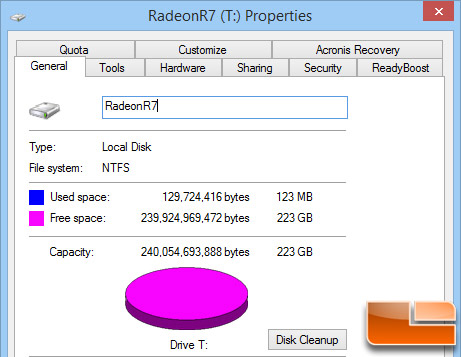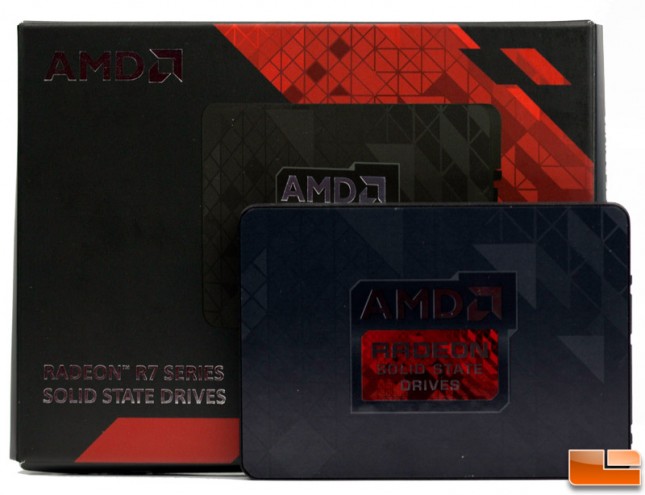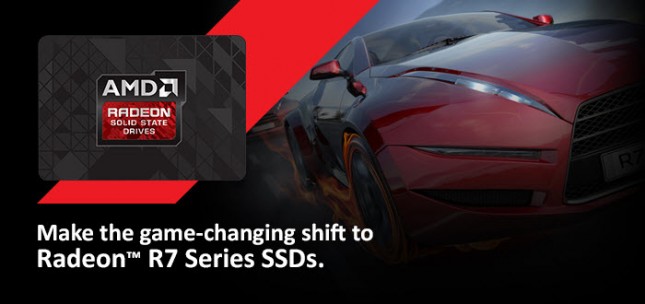AMD Radeon R7 Series 240GB SSD Review
Final Thoughts & Conclusions
Looking at the capacity of the AMD Radeon R7 Series 240GB drive, we saw 256GB (1GB byte = 1,000,000,000 bytes) on board in Windows reports the capacity accessible to the end user as 223GiB (1Gib = 1,073,741,824 bytes) which is right inline with most drives we see including the comparable OCZ Vector 150 and ARC 100 drives.
More and more readers are interested in the power usage for SSDs in addition to the normal performance numbers so we’ve been hooking the drives up to a multimeter during testing so check how power hungry the drives actually are. Our observed power consumption was 0.59W idle and 3.363W maximum active which are each slightly below the given specifications of 0.60W idle and 3.450W active. It’s important to note that there’s currently no support for low power states (i.e. DevSleep) which can be a deciding factor for mobile users. We’re not sure if this could be addressed in a future firmware update or not and something we’ll keep an eye on. As far as the other performance most people are here for is concerned – does it live up to the Radeon moniker that’s typically associated with performance? Yep. However, like AMD’s video cards, it doesn’t lead the pack and but rather offers high-end performance at a reasonable price. Reads of 550MB/s and 530MB/s writes are best case scenario performance but it maintains speeds in that neighborhood across the board with the benchmarks we ran and the performance consistency test showed it can take a beating without suffering crippling degradation. Being an amalgam of the OCZ Vector 150 and ARC 100 drives and the Indilinx Barefoot 3 M00 controller running the show, things turned out pretty much as we expected.
We’re having a look at the drive a bit after it’s spent some time on the open market and in that time the prices have dropped a bit which is good because the initial pricing of $100, $160, $290 for the 120GB, 240GB and 480GB drives faced some stiff competition. Now that prices have settled, the Radeon R7 drive is very competitively priced with the 240GB drive we looked at being about $0.65 per usable GB.
| Capacity: | Part Number |
Current Retail Pricing: |
| 120GB: | RADEON-R7SSD-120G | $89.99 |
| 240GB: | RADEON-R7SSD-240G | $144.99 |
| 480GB: | RADEON-R7SSD-480G | $279.99 |
In comparison, the faster Vector 150 drive is priced about 8% higher and the lesser-performing budget ARC 100 drive selling for roughly 30% less. The R7 carries a 4-year warranty and a rated 30GB/day of host writes, each of which are less than the Vector 150 offers but does come with the same bundle of the adapter plate and Acronis True Image HD imaging software.
Overall, AMD leveraging OCZ hardware to round out their Radeon suite of products is a propitious venture for both. Outside of being buoyed by Toshiba, OCZ could use some of the attention the AMD brand can draw and AMD is really in no position to start cranking out drives of their own without buying someone out or dumping capital into a product with slimming profit margins. It will be interesting to see if this partnership will continue exclusively or if AMD decides to multi-source their SSD supplier chain – although there is a shrinking pool of companies to partner with. One thing is for certain, one of those won’t be Intel.
Legit Bottom Line: Whether or not you’re an AMD fanboy, the Radeon R7 drive lives up to the Radeon brand with performance that doesn’t disappoint.



